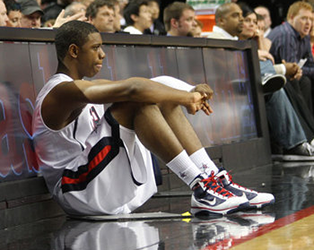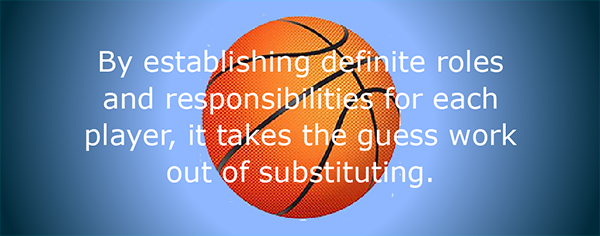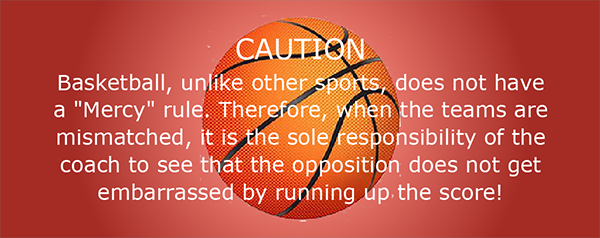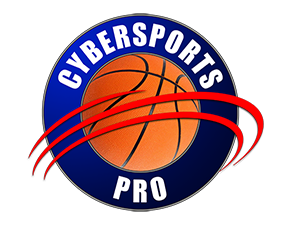- Offensive Techniques & Strategies
Making Sound Substitutions

What to Discover or Recall:
Discover the importance of taking the guess work out of substituting by informing the players as to the planned substitution order and timing.
Learn that players should be made aware that it can be a real advantage to come off the bench.
Understand that any time a player comes out of game to make it mandatory to sit next to coach for communication purposes.
Realize that if you plan on using a player, be sure to get them some playing time in the first half.
Learn to rest your starters and develop the team's depth early in the season.

Come game time, a team should be well prepared technically, physically, and mentally. If the coach has done a great job of teaching and each player knows their role and assignments, substitutions should be just, basically, limited to keeping players rested and out of foul trouble.
However, players should be well aware that it can be a real advantage to come off the bench since it gives a player the opportunity to watch and analyze their opponent actions and strengths. Offensively is the opponent a penetrator? A spot up shooter? A post up player, A screener? An offensive rebounder? etc. Defensively, how do they defend the post? are they zoning? If so, what type of zone and where are the open shots? Also, because officials have a tendency for the officials to call more fouls at the beginning of the game, by coming off the bench these early foul calls can be avoided.
Suggestions & Tips:
Before each game inform the players as to the planned substitution order and timing. When the substitution order is known, the players will be better mentally prepared when it comes time to enter the game. Otherwise, you will have players watching the game clock, hoping to get into the game, instead of watching the game and analyzing their opponents' actions.
However, must be flexible since the best of game plans can go awry with early foul trouble or player injury.
Any time a player(s) come out of game, make it mandatory to sit next to coach for communication purposes. Inform the player of the reason for the substitution, even if it is just for a short rest. To start the game this requires that the sixth person (first sub) sit next to coach on "Ready Alert" mentally prepared to enter the game.
GREAT Substitution rule to use in order to encourage players to hard at all times along with preventing players from hitting the fatigue "wall" along with removing any fear or doubt of not getting back into the game:
If players take them selves out of game (by tugging on shirt) they get to put themselves back into the game when ready. If coach makes the substitution, then coach will make decision when to sub back into the game.
Note: when subbing back into the game, player may not necessary go back in for player who replaced them.
On player mistake(s), try to wait until the player makes a positive play or touches the ball before making a substitution. You certainly do not want players on the court worried that if they make a mistake they will immediately pulled out of the game.
-
To avoid serious player foul trouble, substitute on second personal foul in first half and on third personal foul early in the second half.
AUTOMATIC SUBSTITUTION: On any behavior technical foul substitute immediately and have the player sit down next to coach until cooler head prevails. There is no place on the court for a player that has lost control. Players must be able to play through adversity and not let a bad call, play or opponent action cause them to loose control.
At the beginning of the season, it is wise to rest your top players as much as possible. This will save their "Legs" for the critical end of the season and play-offs as well as reducing the risk of injury resulting from playing when physically tired. However, just as important, by giving reserves valuable playing time and experience, it will develop a team's depth. In the event that a top-lined player is lost during a game or for the season, a player with quality game experience will be able to step-in and take their spot.
On the collegiate level, where RPI ratings are important for post season play and ratings, resting top players is very difficult. However, the basketball season is like a marathon, and you need players with "Fresh Legs" at the end. Forget the stats and rest your top players whenever possible. Go for the "Gold." Many of Championships are lost because of tired legs.
Strategic Substitutions
Early in the game, use substitutes to make changes and adjustments rather than taking a valuable time out.
If you plan on using a player, be sure to get them some playing time in the first half. Certainly, do want to put a player into the game for the first time at the end of a close game.
-
Make a substitute on a free throw situation to set a press or defense.
Alternate offensive and defensive substitutions at end of game on free throws and time outs.
-
When fouling to the stop the clock at the end of the game, make defensive substitutions whenever possible and put players into the game that can afford to foul instead of losing their best players because of disqualification. Once a foul has been committed, stopping the clock, players in foul trouble can be reinserted back into the game. Close game may go several overtimes.
-
Make sure to have your best free throw shooters in the game when the opponent is in a must foul situation.
-
Get an extra ballhandler on the floor against full court pressure.
-
Make a mass substitution on rare occasions. If starters are not playing hard substitute immediately and let them sit for awhile. They will definitely get the message and their attention.
-
To increase defensive motivation and intensity have players play until opponent scores a set amount of points, such as 6 points. They can score all they want, but just do not let the other team score. Once the opponents score six points substitute. You can adjust the points allowed such as six points for starters and four points for reserves.

Lineup Analysis
After the game, in addition to boxscore reports and shot charts, be sure to review the various lineup reports. Examine the most used lineups, most productive lineups, best line up to make defensive stop, and best lineups to force an opponent turnover.
Return to Winning Close Games - Click Here
Return to Coaching Strategies - Click Here
Return to HoopTactics - Click Here
© 2026 HoopTactics All Rights Reserved.

